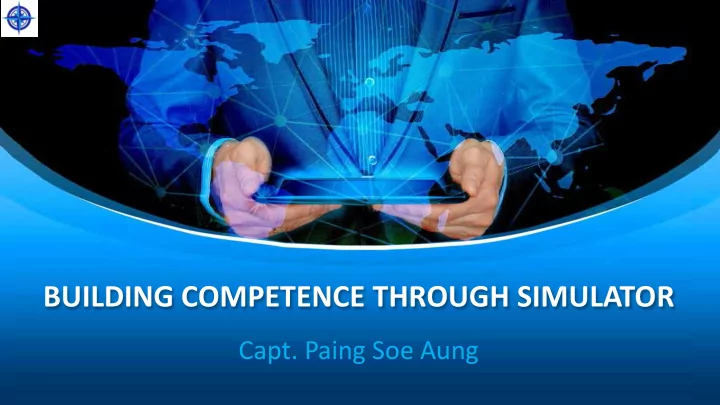

BUILDING COMPETENCE THROUGH SIMULATOR Capt. Paing Soe Aung
CONTENT Technology Evolution Competence based training Setting up a Simulator Benefits and Challenges Development in Myanmar
CONTENT Technology Evolution
Technology Evolution
Technology Evolution
Technology Evolution
Technology Evolution
Technology Evolution
Technology Evolution
Simulators are the most effective tools to achieve hands on experience to be able to adapt with latest technologies Many Challenges are still there!!!!
CONTENT Competence based training
Competence based training Traditional training Competence based training CONTENT, TEXT CONTENT, TEXT ACTIVITIES ACTIVITIES ASSESSMENT / ASSESSMENT/ OUT COME OUT COME
Building Competence through Simulator How Should we? Set up a simulator
CONTENT Setting up a Simulator
Last 3 Years, we Installed Seven Different Simulators FULL MISSION BRIDGE SIMULATOR
Last 3 Years, we Installed the following Different Simulators STEERING SIMULATOR
Last 3 Years, we Installed the following Different Simulators ECDIS SIMULATOR
Last 3 Years, we Installed the following Different Simulators FULL MISSION SHIP CRANE SIMULATOR
Last 3 Years, we Installed the following Different Simulators GMDSS SIMULATOR
Last 3 Years, we Installed the following Different Simulators LIQUID CARGO HANDLING SIMULATOR
Last 3 Years, we Installed the following Different Simulators LNG & LPG CARGO HANDLING SIMULATOR
Definition of simulation IMO Intersessional Simulator Working Group (ISWG) adapted following definition in 1994: Simulation is a realistic imitation, in real time, of any shiphandling, radar and navigation, propulsion, cargo/ballast or other ship-system incorporating an interface suitable for interactive use by the trainee or candidate either within or outside of the operating environment, and complying with the performance standards prescribed in the
Organizations involved in simulation • IMO International Maritime Organization • IMLA International Maritime Lecturers Association. • IMSF International Marine Simulator Forum. • IAMU International Association of Maritime Universities. • GlobalMET Global Association of MET Institutes. • IAMI International Association of Maritime Institutes
TYPES OF MARINE SIMULATORS • navigation equipment • oil spill management • GMDSS • propulsion plant • radar • steam generation plant • radar and navigation • ship handling • electrical power plant • fisheries • refrigeration plant • inland waterways • cargo handling • dynamic positioning • crane handling • ballast control • vessel traffic • dredging ship management • offshore processes • search and rescue • drilling technology
Simulator Hierarchy FULL MISSION FM Radar, MULTI Navigation, TASKS Visual Radar and LIMITTED TASKS Navigation SINGAL TASK Radar Computer Based training (CBT) CBT
DNVGL standard
DNV-GL standard SIMULATOR CLASS DISCRIPTION CLASS A (NAV) / (ENG) Full mission CLASS B (NAV) / (ENG) A multi task simulator CLASS C (NAV) / (ENG) A limited task simulator CLASS S (NAV) / (ENG) A special tasks simulator
STCW Competencies & Simulators
COMPLIANCE • STCW CODE ( A I/12, B I/12) • NATIONAL REQUIREMENTS • REQUIREMENTS BY CLASSIFICATION SOCEITY(If any)
CERTIFICATION
CERTIFICATION
THESE CERTIFICATE CAN BE VERIFIED ONLINE https://www.dnvgl.com/services/certification-of-maritime-simulator-systems-2862
Qualification of Simulator Instructor STCW required that ,the instructor must be “ Appropriately Qualified”. • IMO model course 6.10( Train the Simulator Trainer and Assessor) will be Ideal.
Assessment of Competence by Simulator WHY? STCW Indicated. WHERE? APPROVED SIMULATOR. WHO? QUALIFIED ASSESSOR. HOW? Focus on methods for assessing competence.
EFFECTIVE SIMULATOR TRAINING Simulator Training Student Program Instructor
CONTENT Benefits and Challenges
Pro’s and con’s Advantages • Strong impression teaching tool • Training events repeatable Safety hazards eliminated • • Emergency situations possible Savings in time and equipment • • More readily available than real • Overall reduction training costs
Pro’s and con’s Disadvantages • relatively costly • experienced instructors required • vulnerable complex equipment • scheduling complex
Can you please share what is the biggest Benefit of Simulator?
Connect to Wifi or Mobile data GO TO ANY BROWSER
CONTENT Development in Myanmar
Reforming MET in Myanmar • Government has made first and very important step to change MTE system by allowing the private sector to provide MTE services in 2011. • MET system in Myanmar has many forceful changes after h i
Reforming MET in Myanmar • From 2011 onward DMA has achieved in creating an atmosphere that private MET institution to strive. • Striving of each and every MET institutions mean the whole MET system in Myanmar Strive
Improvement of Simulator in Myanmar
Reforming MET in Myanmar • Increased number of experienced seafarers who want to be maritime instructors. • Instructor and assessor training (model course 6.09,6.10,3.12) from world
Reforming MET in Myanmar • DMA, private MET institutions, and SRPS companies get together and made a comprehensive review of the present MET system in 2017. • New amendment of MET system is focusing not only on STCW requirement but also to fulfill the
Reforming MET in Myanmar Education-related Non- governmental association had established.(eg. Myanmar Nautical Association) HOWEVER, WE STILL HAVE MANY CHALLENGES !!!
THANK YOU
Recommend
More recommend